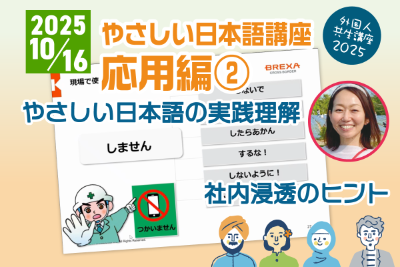- やさしい日本語
- ひらがなをつける
- Language
We provide multilingual content through machine translation. Translation accuracy is not 100%. About the multilingualization of the JAC website
- About JAC
- JAC Membership Information
- Specified Skilled Worker Acceptance
- Specified Skilled Worker Overview of the system
- 10 Mandatory Assistance for Foreigners
- Online individual consultation
- Seminar on Coexistence with Foreign Nationals
- Leading examples of host companies
- Case studies collection "Visionista"
- Foreigner's Voice
- Foreign Resident Acceptance Manual / Q&A
- Useful column "JAC Magazine"
- Acceptance support services
- Specified Skills Acceptance Support Service
- Skills improvement support
- Online Special Education
- Skill training
- Japanese Language Course
- Education and Training Support
- Subsidy system for obtaining qualifications
- Support for creating a comfortable workplace
- Temporary Return Support
- CCUS charge support
- Support system for promoting the accumulation of employment history
- Post-acceptance training
- Compensation system for Specified Skilled Worker (i)
- Daily life support
- Medical interpretation support
- Support for daily life problems
- freeJob matching
- The Specified Skills Evaluation Exam
- Home
- JAC Magazine
- Working with foreign workers
- Explaining common problems that can occur when hiring foreign workers and how to deal with them! Also introducing preventive measures
- Home
- JAC Magazine
- Working with foreign workers
- Explaining common problems that can occur when hiring foreign workers and how to deal with them! Also introducing preventive measures

Explaining common problems that can occur when hiring foreign workers and how to deal with them! Also introducing preventive measures
I wrote the article!

(One company) Japan Association for Construction Human Resources
Research and Development Department
Shunichi Marukura
(Marukura Shunichi)

Hello, this is Marukura from JAC (Japan Association for Construction Human Resources).
When hiring foreign workers, cultural differences can often lead to problems.
If you handle the problem incorrectly, it could lead to litigation and it could also lower the motivation of other employees.
This time, we will explain some common problems that can arise when hiring foreign workers.
We will also introduce ways to deal with problems and preventative measures to avoid them before they occur, so please use this as a reference if you are a company that currently employs foreign workers or plans to do so in the future.
Troubles that tend to occur when hiring foreign workers and problems related to basic rules
We will introduce some examples of common problems that can occur when hiring foreign workers, as well as their causes and how to deal with them.
Troubles regarding residence status
These include problems such as not having the right of residence to work after being hired, or losing your status of residence if your period of stay expires after you are hired.
If an employer employs someone without a resident status, the employer will also be charged with aiding and abetting illegal employment and may be subject to imprisonment of up to three years or a fine of up to 3 million yen.
<Immigration Control and Refugee Recognition Act, Article 73-2>
Any person who falls under any of the following items shall be punished with imprisonment for not more than three years or a fine of not more than 3 million yen, or both.
- 1. A person who has caused a foreigner to engage in illegal employment in relation to business activities
- (2) A person who has placed a foreign national under his/her control in order to have that foreign national engage in illegal employment.
- (3) A person who, as a business, induces foreign nationals to engage in illegal employment activities or mediates the acts described in the preceding paragraph.
Quoted from: e-GOV Law Search "Immigration Control and Refugee Recognition Act, Article 73-2"
[Cause]
This often occurs when a company has not decided how to handle a situation when hiring or renewing a visa.
[Solution]
First, at the time of employment, in accordance with Article 28, Paragraph 1 of the Act on the Promotion of Employment Policies and Standards, we check the residence card of the person to obtain the information necessary to report the employment situation and to confirm that the person has a residence status that allows them to work.
Also, don't just check that the person has a residence status, but that they have a residence status that allows them to do the work that the company plans to have them do.
If you do not have the right to work, you cannot be hired.
Even after you are hired, do not forget to renew your period of stay.
In particular, if your period of stay is long, you may forget to renew your period of stay.
Be careful not to let your period of stay expire by mistake.
Japanese language issues
There are cases where a company hires foreign workers who meet certain standards, such as the Japanese Language Proficiency Test, but have difficulty communicating in Japanese within the company, which can lead to problems such as reduced work efficiency and conflicts.
There seem to be cases where an inability to communicate smoothly in Japanese has led to misunderstandings at work and deterioration of interpersonal relationships.
[Cause]
The Japanese Language Proficiency Test is a test that assesses reading and listening ability.
Since the ability to converse or write cannot be measured, it is possible that a person may be able to understand what is being said but have difficulty conversing.
There are also cases where people can speak everyday conversation but find it difficult to communicate because of the large amount of technical terminology used.
[Solution]
It is possible that an interview will be conducted at the time of hiring to check the candidate's conversational Japanese ability.
Nowadays, interviews can also be conducted online, so if you are looking for speaking skills, this is a good option.
If they are unable to speak because of the large amount of technical terminology, support will also be needed, such as creating a vocabulary list that compiles technical terms and explanations in the foreign worker's native language and simple Japanese.
In particular, the words regarding occupational safety and health are important.
When it comes to terminology related to occupational safety, such as terms used in KY activities, it is advisable for the company to provide as much support as possible and create an environment in which smooth communication can take place.
We can also hire qualified Japanese language teachers to provide Japanese language instruction, train Japanese staff on how to speak clearly to foreign staff, and create booklets with foreign language descriptions of facilities, work equipment, and tasks.
JAC offers free Japanese courses for Specified Skilled Worker (i) foreigners and Technical Intern Training students who are aiming to obtain a Specified Skilled Worker (i).
From beginner to advanced, we offer a variety of courses to suit each level and purpose.
By having foreigners learn Japanese, it will be easier to manage the safety of foreign employees, and it will also lead to smoother internal communication and work efficiency.
We have also heard that the improved Japanese language ability of foreign employees has led to a better atmosphere within the company and an increase in the rate at which Japanese employees are retained.
Through "JAC's Free Japanese Language Courses," we will support you in creating an environment where all employees, including foreign employees, can easily communicate with each other!
JAC's Free Japanese Language Course
Suddenly quitting or going missing
This is not just a problem for foreigners, but for Japanese people too: sometimes people suddenly stop coming to work or lose contact.
Please be aware that foreigners will need to file a notification and follow different procedures than Japanese people.
[Cause]
There are many reasons for this, including low wages, dissatisfaction with the work content, poor interpersonal relationships, and not being able to adapt to Japan.
[Solution]
If it becomes difficult to accept the person, you may be required to notify the Immigration Services.
There is a possibility that you may have been involved in an incident or accident, so you should also consider filing a police report.
In order to prevent sudden resignations, it is necessary to be careful not to make employees work under unfair working conditions.
We should also create an environment where people feel comfortable discussing personal issues such as dissatisfaction with wages and working conditions, as well as interpersonal problems and the inability to adapt to life in Japan.
Specifically, it is necessary to create a support environment by maintaining close communication and setting up consultation desks, and to have a system in place that allows for early detection of abnormalities.
What if there's a dispute between employees?

Troubles can sometimes arise between foreign workers, or between Japanese employees and foreign workers.
There are many reasons for this, including cultural, religious and racial differences, territorial disputes and remnants of colonial rule.
When a dispute arises, it is important to listen to both sides and make an impartial judgment on their side of the story.
It is important to understand that religious, racial, and ethnic differences are such sensitive topics that they can sometimes lead to war.
What problems can occur when signing contracts with or firing foreign workers?

In order to prevent problems when hiring foreign workers, be sure to explain contracts and company rules in an easy-to-understand, simple and clear manner.
The way the contract is signed is particularly important.
If the employment contract is only in Japanese and the explanations are difficult to understand, there is a high possibility that employees will misunderstand and say, "My actual employment situation is different from the contents of the contract."
It is important to write in easy-to-understand Japanese, and if necessary, to also write in your native language.
When explaining this face-to-face at the time of hiring, be sure to explain everything carefully so that nothing is left out.
Even after being hired, the unique Japanese concepts of "reading the atmosphere" and "guessing" will not work. In some cases, it may be necessary to explain things to foreign workers in their native language or communicate through an interpreter.
In addition, when hiring foreign workers, be sure to check the "Guidelines for employers to take appropriate measures regarding improving employment management of foreign workers (Guidelines for foreign workers)".
The Guidelines for Foreign Workers stipulate measures that employers who employ foreign workers should take to improve the employment management of foreign workers.
Specifically, the following items are stipulated:
- Optimizing the recruitment and hiring of foreign workers
- Ensuring fair working conditions
- Ensuring safety and health
- Employment Insurance, worker accident insurance, Health Insurance and Employees' Pension Insurance
- Appropriate personnel management, education and training, employee benefits, etc.
- Preventing dismissals and providing assistance with finding new employment
- Points to note for employers who engage in labor dispatch or contracting
Responding based on the guidelines for foreigners is essential to deepening mutual understanding between foreign workers and the companies accepting them and allowing foreign workers to work in Japan with peace of mind.
If this is your first time accepting foreign workers and you are feeling anxious, you can also entrust the matter to a professional, such as a lawyer or a foreign recruitment service company.
Summary: When it comes to problems with hiring foreign workers, it is important to correctly identify the cause and take appropriate measures.
When accepting foreign workers from different cultures and races, mutual understanding between the foreign workers and the accepting company is important for the smooth running of operations.
In the unlikely event that a problem does occur, knowing the cause and how to deal with it can help prevent it from becoming a bigger problem.
Common problems that can arise include issues with residence status and Japanese language.
Also, although this is not limited to foreign workers, there are also cases where workers suddenly quit or go missing.
It is necessary to create an environment that facilitates communication between foreign workers and the companies accepting them, and to clearly define the items that companies must check and how they must respond regarding residence status.
When discussing or explaining things, the key is to be clear and understandable.
If you find this difficult, you may want to entrust the task to a professional, such as a lawyer or a foreign recruitment service company.
If you are a construction company considering accepting Specified Skilled Worker, please feel free to contact JAC!
*This column was written based on information from October 2022.
The author of this article

(One company) Japan Association for Construction Human Resources
Research and Development Department
Shunichi Marukura
(Marukura Shunichi)
Born in Kanagawa Prefecture.
Every month, I interview Japan construction companies and Specified Skilled Worker who work there, and publish articles on the web.
In the blog, I will introduce you to the construction skilled foreigner system, tips for living in Japan, and interesting stories that I was able to cover. If you have a topic you'd like to cover, please contact us!
Related articles

What is the Japanese level of Specified Skilled Worker? Precautions and measures after acceptance

Things to know when working with Muslim employees in a Japanese company

What is the obligation to notify the employment status of foreigners? Foreign workers who must be notified and how to apply

What is the status of residence that allows you to work? Explaining the types, how to obtain it, and more!

















